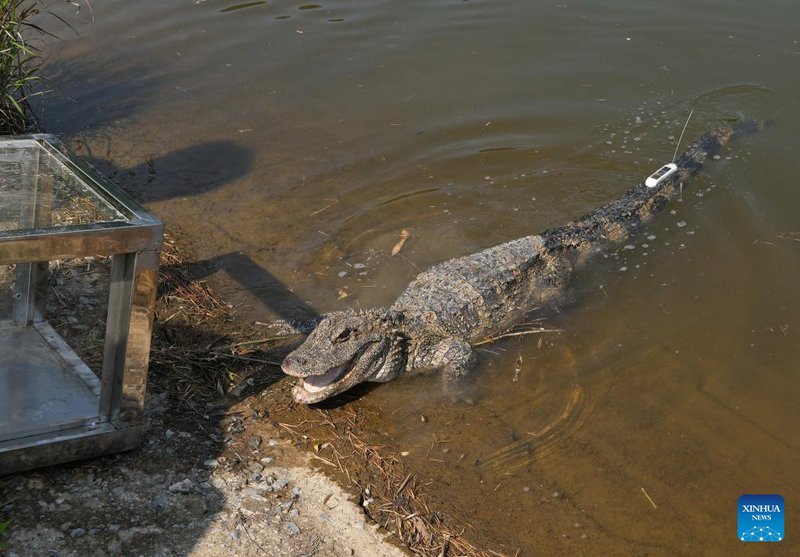
Picture this: you’re visiting a serene wetland in China, enjoying the beautiful scenery. Suddenly, you spot a creature lounging in the sun. It’s got that classic alligator look—scaled skin, a wide snout, and those piercing eyes. To many, it’s just a part of nature’s beauty. But like any wild animal, understanding its behavior and temperament is vital. So, should we regard the Chinese alligator as a potential threat or simply a fascinating part of the ecosystem?
Let’s explore this topic step by step.
1. What is the Chinese Alligator?
The Chinese alligator (*Alligator sinensis*) is a small species of alligator that typically doesn’t exceed 7 to 8 feet in length. Unlike its larger American counterpart, the Chinese alligator is much more docile in nature. They reside primarily in freshwater habitats, like rivers and lakes, in eastern China. The current population is limited, and they are classified as critically endangered, making encounters with humans relatively rare.
Physical Features: The Chinese alligator has a broad, robust body covered with thick scales that often appear dark brown or black. Their unique appearance, with a wider snout and shorter limbs compared to other alligators, makes them quite distinct. Their small size means they typically weigh between 100 to 150 pounds, which is a fraction of the weight of larger alligators.
Habitat and Lifestyle: These alligators prefer still freshwater bodies, swamps, and marshes. They tend to be nocturnal, meaning they’re more active at night, which is when they hunt for fish, frogs, and other small animals. Their shy nature usually leads them to stay away from human activities, which is a good thing for those living nearby.
2. How Do They Interact with Humans?
Here’s the thing: most of the time, the Chinese alligator is not a threat to humans. They are generally shy creatures that prefer to avoid encounters. But as with any wild animal, it’s essential to understand their behavior and the situations that could lead to an interaction.
Typical Behavior: Chinese alligators are not known for aggressive behavior. In fact, when startled, they often slip quietly into the water instead of confronting threats. However, if provoked or cornered, any animal can react defensively. It’s crucial to respect their space and observe from a distance.
Human Encounters: Encounters with humans are rare. When they do happen, they’re often the result of humans venturing too close to their habitats. While the alligator may not seek out conflict, it’s always wise to treat any wild animal with caution.
3. Can They Be Dangerous?
You might be wondering, could the Chinese alligator ever pose a danger to humans? It’s a valid concern, especially if you’re in an area where they live. Generally speaking, the danger is minimal, but understanding the nuances can help put the issue into perspective.
Defensive Behavior: In cases where these alligators feel threatened, they might defend themselves. This could involve snapping their jaws or thrashing about. Though it’s unlikely they’d seek out a human as a target, any approach could cause them to react.
Injuries and Attacks: While there have been a few reports of bites, they usually relate to humans getting too close or attempting to capture the animal. For the most part, there are no documented attacks on humans that would classify these alligators as dangerous. It’s more about creating an appropriate distance where both creatures can coexist peacefully.
4. Cultural Significance and Conservation Efforts
The Chinese alligator holds a special place in Chinese culture and history. They’ve been part of myths and stories for centuries. However, the harsh reality is that their population has drastically declined due to habitat destruction, pollution, and hunting.
Myths and Folklore: In various Chinese cultures, alligators are often depicted as symbols of strength and bravery. However, the stories surrounding them sometimes blend fear with reverence. Unfortunately, this admiration hasn’t translated to effective conservation—many people remain unaware of their plight.
Conservation Efforts: Organizations and governments are working towards protecting this endangered species. Efforts include habitat restoration, breeding programs, and education to raise awareness about their significance and dangers. By supporting these initiatives, we can help ensure that future generations will be able to admire the beauty of the Chinese alligator in the wild.
5. What to Do If You Encounter One
If you find yourself near a Chinese alligator, there are a few important actions to keep in mind. It’s all about ensuring safety for both you and the animal.
Stay Calm: If you spot an alligator basking in the sun or swimming, don’t panic. Remember, they likely want to avoid you just as much as you want to avoid them.
Keep Your Distance: Always maintain a safe distance. Do not attempt to approach or feed the animal, as this can lead to defensive behavior. Instead, enjoy observing them from afar.
Contact Authorities: If you believe the alligator is in a dangerous situation or poses a risk to people, contact local wildlife authorities. They can assess the situation and manage it appropriately.
6. Comparisons with Other Alligator Species
If you’re considering the danger posed by the Chinese alligator, it can be helpful to compare it with other alligator species.
American Alligator vs. Chinese Alligator: The American alligator is significantly larger and more aggressive, especially during mating season. While they can also be shy, they are known to exhibit territorial behavior when protecting their nests. In contrast, the Chinese alligator is less assertive and prefers to avoid confrontation.
Other Crocodilians: Similarly, when compared to crocodiles, which can be quite aggressive and territorial, the Chinese alligator stands out as the more peaceful option. This doesn’t mean you should dismiss them entirely, but it’s an important distinction to note.
7. Summing It Up
In a nutshell, while the Chinese alligator has a reputation that might raise eyebrows, they are generally not a danger to humans. With their naturally shy demeanor, they prefer to avoid encounters altogether. Understanding their behavior and respecting their habitat is key to coexisting peacefully.
So, if you plan a trip to China or find yourself near a wetland where these fascinating creatures live, remember they’re more of a gentle giant in their world. By appreciating them from a distance and supporting conservation efforts, we can ensure that both humans and Chinese alligators continue to thrive in harmony.

